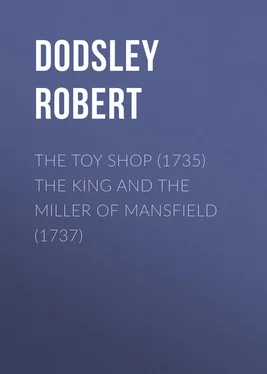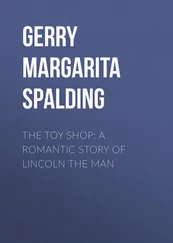Robert Dodsley - The Toy Shop (1735) The King and the Miller of Mansfield (1737)
Здесь есть возможность читать онлайн «Robert Dodsley - The Toy Shop (1735) The King and the Miller of Mansfield (1737)» — ознакомительный отрывок электронной книги совершенно бесплатно, а после прочтения отрывка купить полную версию. В некоторых случаях можно слушать аудио, скачать через торрент в формате fb2 и присутствует краткое содержание. Жанр: literature_18, foreign_antique, foreign_prose, foreign_dramaturgy, на английском языке. Описание произведения, (предисловие) а так же отзывы посетителей доступны на портале библиотеки ЛибКат.
- Название:The Toy Shop (1735) The King and the Miller of Mansfield (1737)
- Автор:
- Жанр:
- Год:неизвестен
- ISBN:нет данных
- Рейтинг книги:5 / 5. Голосов: 1
-
Избранное:Добавить в избранное
- Отзывы:
-
Ваша оценка:
- 100
- 1
- 2
- 3
- 4
- 5
The Toy Shop (1735) The King and the Miller of Mansfield (1737): краткое содержание, описание и аннотация
Предлагаем к чтению аннотацию, описание, краткое содержание или предисловие (зависит от того, что написал сам автор книги «The Toy Shop (1735) The King and the Miller of Mansfield (1737)»). Если вы не нашли необходимую информацию о книге — напишите в комментариях, мы постараемся отыскать её.
The Toy Shop (1735) The King and the Miller of Mansfield (1737) — читать онлайн ознакомительный отрывок
Ниже представлен текст книги, разбитый по страницам. Система сохранения места последней прочитанной страницы, позволяет с удобством читать онлайн бесплатно книгу «The Toy Shop (1735) The King and the Miller of Mansfield (1737)», без необходимости каждый раз заново искать на чём Вы остановились. Поставьте закладку, и сможете в любой момент перейти на страницу, на которой закончили чтение.
Интервал:
Закладка:
The Toy-Shop had been Dodsley's attempt to adopt sophisticated city ways; The King and the Miller of Mansfield is a return to his "native Sherwood." Instead of indulging in the sometimes labored, sometimes second-hand wit and contemptuous satiric stance of the earlier play, The King and the Miller of Mansfield reflects the earnest sentimentality and democratic impulse of the ballad, later printed in Percy's Reliques (1765), upon which the play is modeled. The plot is simple. Henry II, lost and separated from his courtiers in Sherwood Forest, is given shelter by honest John Cockle, a miller in nearby Mansfield and one of His Majesty's Keepers of the Forest. Meanwhile, at the miller's house, his son Dick and Dick's former sweetheart Peggy plan how to gain access to the king so that he might redress the wrongs done to their innocent love by the lust of the haughty Lord Lurewell. By coincidence Lurewell is one of the courtiers lost in the forest. In the final scene, with all the principals assembled, the king's identity is made known and distributive justice dispensed.
Allardyce Nicoll argues that the success of The King and the Miller of Mansfield makes Dodsley the most important sentimentalist of the thirties. 6 6 Allardyce Nicoll, A History of English Drama 1660-1900 , 6 vols. (Cambridge: Cambridge University Press, 1955-60), 2:204.
Certainly the play was frequently produced with revivals of earlier sentimental works like Cibber's Love's Last Shift (1696) and Steele's The Conscious Lovers (1723); and, in fact, it would be difficult to find a list of definitive characteristics of sentimental drama that Dodsley's play does not satisfy in every particular. The bourgeois nobility and integrity of Dick and Peggy poignantly engage the audience's pity and admiration, while the improbable resolution affirms the inevitable triumph of goodness. There is even – what some critics have required of sentimental drama – love of rural scenery and use of native setting. 7 7 For a survey of attempts to characterize sentimental drama, see Arthur Sherbo, English Sentimental Drama (East Lansing: Michigan State University Press, 1957).
Dodsley has cleverly integrated scene and theme in The King and the Miller of Mansfield . The moral and social problem stressed in the play is the existence and abuse of aristocratic privilege. Implicitly the play assumes that rank should correlate with goodness. The king himself is the best example of this. Alone at night in Sherwood Forest, Henry asks himself, "Of what Advantage is it now to be a King? Night shews me no Respect: I cannot see better, nor walk so well as another Man" (p. 11). Cut off from the trappings of monarchy he finds his common humanity and, at the conclusion of the play, redresses the wrongs of rank when he knights the instinctively noble miller and reproves the vicious but hereditarily titled Lord Lurewell. His accidental separation from the corruption of court and courtiers initiates Henry's contact with John Cockle, representative of all the middle-class virtues. Significantly, they are in the miller's environment: rural England, symbol of uncorrupted beauty, correlative to the innocent beauty of young Peggy before her acquaintance with Lords "of Prerogative." 8 8 John Loftis, The Politics of Drama in Augustan England (Oxford: Clarendon Press, 1963), 116-17.
As critics have noted, the whole sentimental movement in English drama is opposed in tone to the cynical ethos of aristocratic privilege; but Dodsley explicitly advocates a democratic sensibility that estimates individual worth independent of the accident of birth. The "bourgeois sententiae" of The King and the Miller of Mansfield are certainly as ideologically explicit as the arguments for the value of the mercantile middle class in Lillo's The London Merchant (1731). 9 9 Laura Brown, English Dramatic Form, 1660-1760: An Essay in Generic History (New Haven: Yale University Press, 1981), 148.
Dodsley did, after all, have working-class credentials; his years in "service" furnished the materials for Servitude: A Poem (1729) and A Muse in Livery (1732). The allegorical frontispiece to A Muse in Livery shows a young man aspiring to knowledge, virtue, and happiness but manacled by poverty to misery, folly, and ignorance, his foot chained to a giant stone inscribed "Despair."
Despite the play's clear egalitarian sympathies, it seems excessive to characterize Dodsley's work as "revolutionary" and to be reminded too forcibly of the coming events in France. And yet, as has also been suggested, things might now look different had there been a revolution in England. Plays like Dodsley's discomforted the government. As Fielding notes in the dedication of The Historical Register, For the Year 1736 , the Gazetteer of 7 May 1737 had accused his play and Dodsley's The King and the Miller of Mansfield of aiming at the overthrow of Walpole's ministry. "Bob Booty" reacted to this threat from the stage by enacting legislation in June requiring that all new plays and all alterations of old plays be approved by the Lord Chamberlain; in contrast, the reaction of the monarchy to Dodsley's work was much more ingenious. The third performance of The King and the Miller of Mansfield , that from which the author was to receive the proceeds, was held "By Command of their Royal Highness the Prince and Princess of Wales." Both royal personages were present to honor the apprentice from Mansfield. "The Boxes not being equal to the Demand for Places, for the better Accommodation of the Ladies, Side Boxes [were] made on the Stage." 10 10 London Stage: Part 3 , 635.
Although the production of Dodsley's best play, Cleone (1758), was still twenty years in the future, it seems safe to regard this night as the height of Dodsley's dramatic career.
Auburn University
BIBLIOGRAPHICAL NOTE
The Toy-Shop (1735) is reproduced from the copy of the first edition in the Henry E. Huntington Library (Shelf Mark: 152063). A typical type-page (p. 23) measures 135 x 72 mm.
The King and the Miller of Mansfield (1737) is reproduced from the copy of the first edition in the William Andrews Clark Memorial Library (Shelf Mark: *PR3409/D7K5). A typical type-page (p. 13) measures 145 x 73 mm.
EPILOGUE
Well, Heav'n be prais'd, this dull grave Sermon's done.
(For faith our Author might have call'd it one)
I wonder who the Devil he thought to please!
Is this a Time o' Day for Things like these?
Good Sense and honest Satire now offend;
We're grown too wise to learn, too proud to mend.
And so divinely wrapt in Songs and Tunes,
The next wise Age will all be – Fiddlers Sons.
And did he think plain Truth wou'd Favour find?
Ah! 'tis a Sign he little knows Mankind!
To please, he ought to have a Song or Dance,
The Tune from Italy, the Caper France:
These, these might charm – But hope to do't with Sense!
Alas, alas, how vain is the Pretence!
But, tho' we told him, – Faith, 'twill never do. —
Pho, never fear, he cry'd, tho' grave, 'tis new:
The Whim, perhaps, may please, if not the Wit.
And, tho' they don't approve, they may permit.
If neither this nor that will intercede,
Submissive bond, and thus for Pardon plead.
"To gen'rous Few, to you our Author sues
His first Essay with Candour to excuse.
'T has Faults, he owns, but, if they are but small,
He hopes your kind Applause will hide them all."
Интервал:
Закладка:
Похожие книги на «The Toy Shop (1735) The King and the Miller of Mansfield (1737)»
Представляем Вашему вниманию похожие книги на «The Toy Shop (1735) The King and the Miller of Mansfield (1737)» списком для выбора. Мы отобрали схожую по названию и смыслу литературу в надежде предоставить читателям больше вариантов отыскать новые, интересные, ещё непрочитанные произведения.
Обсуждение, отзывы о книге «The Toy Shop (1735) The King and the Miller of Mansfield (1737)» и просто собственные мнения читателей. Оставьте ваши комментарии, напишите, что Вы думаете о произведении, его смысле или главных героях. Укажите что конкретно понравилось, а что нет, и почему Вы так считаете.










